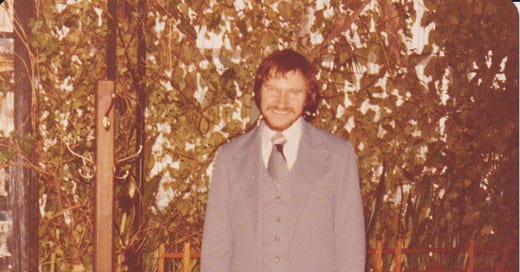When he was just 45 years old, my father was diagnosed with malignant melanoma, the most aggressive form of skin cancer. After having the original tumor removed, followed by chemotherapy, the cancer continued to spread. At that point, doctors told my dad that there was nothing more that they could do for him.
What would you do if you had a terminal cancer diagnosis?
I’ve thought about that question often, especially because; until recently, I believed that cancer was largely hereditary and that I was at high risk of contracting it myself.1 The answer I came up with is informed largely by what I observed in my father’s last year of life, and what I learned became my First Happiness Lesson.
When it was clear to my dad that, barring a miracle, he was leaving this Earth sooner than he would like, he began to make changes. I have no insights into what he was thinking at the time, because he didn’t share that with me, but his actions spoke volumes.
The changes my father made to his life were huge and he made them rather quickly, as well. He quit his job as a pastor. He bought my mom a house and made extensive renovations to it. He began spending more time with his family and friends.
Amidst these more public changes, he also made private alterations to his life and behavior. He bought gifts for my mom on Valentine’s Day that year, which was something he rarely did. He also took her on a romantic vacation at Niagara Falls for their March anniversary. And, of course, he bought her that house!
My dad also spent more time with my brother and me. He began playing softball with us in a co-ed league.2 He began a tradition on Friday evenings of gathering my mom, my brother and me in the living room so we could watch “The Dukes of Hazzard” as a family. (I didn’t care much about the show, but our Friday TV nights is one of my favorite memories of my dad.)
Though my dad didn’t do many things just for himself during his final year, one thing he did still brings a smile to my face. For those Friday TV times with us, he sprang for his favorite crackers, Chicken in a Biskit, even though they were a bit beyond our normal budget for crackers. ;) It was a small thing, to be sure, but even in that small gesture, my father taught me that we need to honor ourselves by finding and embracing the little joys of life.
My dad’s determination to make the most out of his last year didn’t end with just his immediate family. He took us to visit our extended family. The trip I remember the most was a visit to my mom’s sister and her family in Ohio. He did all the driving and kept a smile on his face throughout the trip, even though the cancer was beginning to take a toll on his body during that time.
Perhaps the most surprising thing my father did after his diagnosis was spend less time on God and church. My dad spent his entire life serving God and I can only assume that he realized that God would be OK with him spending some time on himself. What I know for sure is that my dad wasn’t worried about the Afterlife. He had a strong faith and believed without a doubt that he was going to heaven.
My father continued to make the most out of every day until his body would no longer allow it. His terminal cancer diagnosis was the reason he changed his life, adding more fun, working less, and focusing on his family.
I remember realizing at some point many years after he died how sad it was that my dad waited until he had a terminal illness to allow more joy into his life. But I think that’s the way it often goes. Until we have a compelling reason to change, we often won’t.
The lesson I learned from my dad was not to wait until my days are literally able to be numbered until I enjoy life. I felt that my dad was, sadly, trying to catch up on so many things at the end of his life that he previously assumed he’d have time for in the future. But playing catch-up is a terrible way to live life, especially when one of the challenges of it is a failing physical body.
Though losing my father when I was so young (I was only 15) was devastating to me, I’m grateful that my father gave me my first lesson on happiness:
Don’t wait for a reason to enjoy life. Enjoy every moment as if it were (almost) your last.
My dad unknowingly drove home the lesson that I should not wait too long before enjoying life. While he was successful in cramming joy into the end of his life, I may not be able to achieve what he did. More importantly, there is no need to wait until getting a terminal diagnosis to decide to enjoy life. I can and should enjoy life NOW.
I still consider what I would do with my life if I were to be presented with a terminal diagnosis of my own. Very quickly, however, I remember My First Happiness Lesson and my angst about the thought disappears. If I am clear about my priorities, of what truly matters in this life, and if I live each day enjoying those things that matter the most, I will be fine no matter when my life ends.
I’ve spent a good portion of my life with my dad’s unwitting lesson in mind. I don’t want to have to play catch-up when my end is near. I’ve tried to enjoy as much of life as possible. I do things — big and small — for myself every day. I make time for family and friends, even when it might be easier to be lazy at home.
I live presently in each moment as much as possible. I surround myself with things I enjoy, such as flutes, cats, and gardens. I make music as much as possible. I dance when I hear a great song. And, of course, I record my ponderings on happiness, healing, and harmony for you and for those who might read them after I’m gone.
I no longer fear death and though I’m hoping to stick around for many more years, I think I’ll be accepting of it when my end of life comes. I have lived a full life already, so what happens from here on out feels like icing on my very delicious cake called Life.
If you haven’t already done so, think about My First Happiness Lesson. Could it be a lesson for you, as well? What are you waiting to do? If you haven’t made it a priority yet, why not?
None of us is guaranteed that “someday” is going to come. We only have today, so let’s begin immediately in living a life that would make even a dying man (or woman) happy. :)
I now believe that our genes play only a small part in whether we will develop a certain disease or not. My research suggests that factors such as exposure to toxins, eating foods with low nutritional value, lack of adequate sleep, emotional health, and many other nonheritable issues are often overlooked when determining risks of disease.
A little known fact is that I did, indeed, play softball! Not often because I sorta hate sports, but I have played softball a couple of times because of the cool folks I got to hang out with when I did so.






